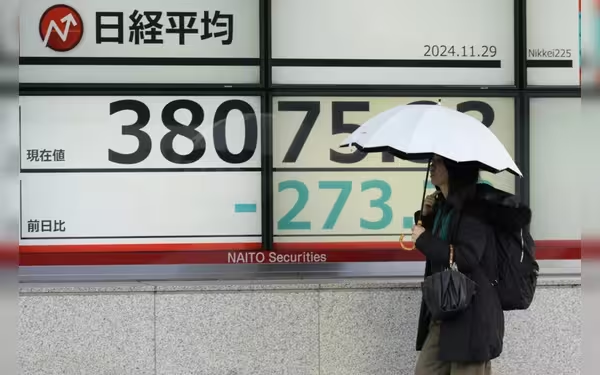Sunday, December 22, 2024 03:58 AM
Global Markets Decline Ahead of Key Economic Indicators
- U.S. markets closed for Thanksgiving, causing investor uncertainty.
- Tokyo inflation rises, impacting Bank of Japan's policy decisions.
- Chinese markets show resilience amid global downturn.
 Image Credits: thefrontierpost
Image Credits: thefrontierpostGlobal financial markets faced a downturn as U.S. markets closed for Thanksgiving, with key economic indicators on the horizon.
Global financial markets experienced a downturn on Friday, following the closure of U.S. markets on Thursday due to the Thanksgiving holiday. This pause in trading left investors on edge, as they awaited crucial economic indicators that could shape future monetary policies.
In Europe, France’s CAC 40 index remained nearly unchanged at 7,178.37 during early trading. Meanwhile, Germany’s DAX saw a slight decline of 0.1%, settling at 19,407.50. The British FTSE 100 also dipped marginally, falling less than 0.1% to 8,279.02. Investors are particularly focused on the upcoming preliminary inflation data for November in the Eurozone, which is expected to play a significant role in the European Central Bank’s decisions regarding interest rates.
Across the Atlantic, futures for the S&P 500 and the Dow Jones Industrial Average showed a positive trend, both rising by 0.3%. U.S. markets are set to reopen for a half day of trading on Friday, which may bring some volatility as traders react to the latest economic news.
In Asia, the Tokyo Nikkei 225 index fell by 0.4% to 38,208.03. This decline followed the government’s report indicating that inflation in Tokyo rose to 2.6% in November, up from 1.8% the previous month. The increase was largely attributed to a spike in fresh food prices. Core inflation, which excludes these volatile food prices, also saw a modest rise to 2.2% year-on-year from 1.8% in October. Such inflationary pressures are likely to influence the Bank of Japan’s monetary policy, potentially leading to further increases in its benchmark lending rate.
The Japanese yen was trading at 150.02 to the U.S. dollar, a notable improvement from the previous week when it was above 155 yen per dollar. The Bank of Japan currently maintains a policy rate of 0.25%, having only recently moved away from a prolonged period of negative rates.
South Korea’s Kospi index faced a more significant drop, losing 2% to 2,455.91 after the central bank decided to cut its benchmark interest rate on Thursday in an effort to stimulate its slowing economy. In contrast, Australia’s S&P/ASX 200 index edged down by 0.1% to 8,436.20.
On a brighter note, Chinese markets showed resilience, with Hong Kong’s Hang Seng index gaining 0.3% to 19,423.61 and the Shanghai Composite index surging by 0.9% to 3,326.46. The rise in Chinese markets was driven by gains in retail stocks, following a two-day meeting in Beijing aimed at boosting consumption.
As the holiday on Thursday provided a brief pause from the political turmoil surrounding President-elect Donald Trump’s economic policies, investors are left to ponder the implications of his proposed tariff hikes on imports from Canada, Mexico, and China. Earlier in the week, the S&P 500 fell by 0.4%, while the Dow and Nasdaq composite also experienced declines of 0.3% and 0.6%, respectively.
In the commodities market, U.S. benchmark crude oil prices fell by 16 cents to $68.56 per barrel, while Brent crude, the international standard, decreased by 37 cents to $72.41 per barrel.
As global markets navigate through a complex web of economic indicators and political developments, investors must remain vigilant. The upcoming inflation data and central bank decisions will be pivotal in shaping market trends. Understanding these dynamics is crucial for making informed investment choices in an ever-evolving financial landscape.













